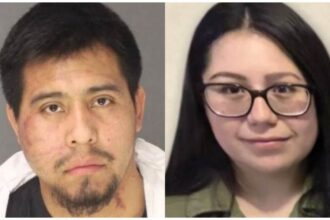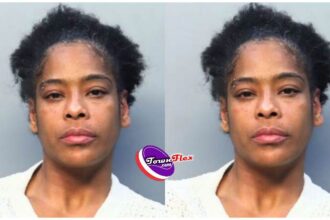Florida prosecutors have announced their intention to pursue the death penalty against Naikishia Williams, 32, who is accused of murdering her 7-year-old daughter, Nia Williams, in a shocking case that has sparked outrage and raised serious questions about child protection oversight.
Williams, indicted in June, faces charges of first-degree murder and aggravated child abuse following the disturbing events of April 28 in Riviera Beach. Prosecutors contend that the killing was “especially heinous, atrocious, or cruel,” and executed “in a cold, calculated, and premeditated manner without any pretense of moral or legal justification.”
Additional aggravating factors cited include the victim’s age, Nia was under 12, and the fact that Williams held custodial authority over her.
According to an eight-page probable cause affidavit, Nia endured years of suspected abuse. Her struggles began at birth when Williams allegedly abandoned her at the hospital. The child spent her early months in foster care before being placed with Rebecca Finley and Whytni Walker, caretakers who also looked after Williams’ other children.
Despite their efforts, Nia was repeatedly returned to her biological mother — and each time, the injuries mounted. In 2021, Nia was hospitalized with a broken femur and a head laceration. Shockingly, Williams allegedly failed to remove the staples from her daughter’s head, allowing skin to grow over them. That same year, Nia suffered a broken arm. By 2022, she was treated for severe burns from boiling water, the affidavit says.
Despite these red flags, child protective services allowed Williams to regain custody in 2023 after completing a parenting course — a decision now under scrutiny.
According to Finley, Williams had a history of substance abuse and frequently took out her anger on her children, with Nia bearing “the brunt” of the physical and emotional abuse.
Nia’s school life painted a similarly troubling picture. She missed around 50 school days during the 2024-2025 academic year. When she did attend, she often appeared unwell and wore dirty clothes. A teacher described Nia as “brilliant and sweet”, but said attempts to contact Williams about concerns went unanswered.
On April 25, just days before her death, Nia showed up at school in visible distress — vomiting, shivering, and complaining of severe stomach pain. The school nurse was unable to treat her because Williams never signed the parental consent forms, nor did she respond to urgent calls from the school.
According to police, the events that led to Nia’s death were triggered by something tragically minor — a spilled bowl of cereal. One of her siblings told investigators that Williams forced Nia to lie on the ground and then stomped on her stomach several times, reportedly “like you stomp an ant.”
Williams allegedly made her daughter clean the mess and then kicked her for not moving fast enough, before forcing her to clean the toilet, shower, and kitchen sink while in obvious pain.
On the day Nia died, Williams woke her at 7 a.m. and made her eat. By 4 p.m., Nia’s sister found her barely breathing with her eyes open. Williams, according to police, waited four hours before calling 911.
Paramedics were told Nia might have overdosed, prompting the use of Narcan. But toxicology reports showed no medication in her system. Instead, doctors found she had a lacerated liver, was in renal failure, and had internal bleeding. Her large intestines had detached from her abdomen, and half of her blood supply had pooled in her stomach.
Nia was pronounced dead at 11:15 p.m. on April 28. The death was officially ruled a homicide.
Following the arraignment, Rebecca Finley and Whytni Walker spoke to local media outlet WPTV, expressing grief and frustration over the system’s failure to protect Nia.
“She should have been in jail a long time ago,” Finley said.
Finley added that she contacted Florida’s Department of Children and Families just two weeks before Nia’s death, reporting that the girl appeared “very malnourished.” She emphasized that multiple warnings had gone unheeded.
“There wasn’t one person who was not aware of this young lady being a dangerous mother,” Finley said.
DCF has not responded to requests for comment from Law&Crime.
Despite their grief, Finley and Walker say they are determined to seek justice.
“We can never get her smile back,” Walker said. “We can never talk to her again.”
Naikishia Williams is scheduled to appear in court again on August 13. As the case progresses, questions surrounding Florida’s child welfare system, accountability, and the handling of past abuse reports are likely to intensify.
This heartbreaking story has not only drawn national attention but has also highlighted the need for stronger protections for vulnerable children and stricter intervention protocols for repeat offenders.









